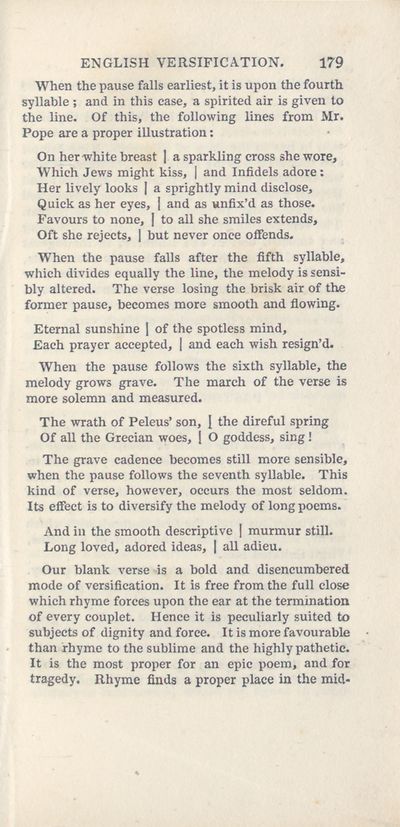Education > Essays on rhetoric
(207)
Download files
Complete book:
Individual page:
Thumbnail gallery: Grid view | List view

ENGLISH VERSIFICATION. 179
When the pause falls earliest, it is upon the fourth
syllable ; and in this case, a spirited air is given to
the line. Of this, the following lines from Mr.
Pope are a proper illustration:
On her white breast | a sparkling cross she wore.
Which Jews might kiss, | and Infidels adore:
Her lively looks J a sprightly mind disclose.
Quick as her eyes, | and as unfix’d as those.
Favours to none, J to all she smiles extends.
Oft she rejects, | but never once offends.
When the pause falls after the fifth syllable,
which divides equally the line, the melody is sensi¬
bly altered. The verse losing the brisk air of the
former pause, becomes more smooth and flowing.
Eternal sunshine \ of the spotless mind.
Each prayer accepted, | and each wish resign’d.
When the pause follows the sixth syllable, the
melody grows grave. The march of the verse is
more solemn and measured.
The wrath of Peleus’ son, 1 the direful spring
Of all the Grecian woes, | O goddess, sing!
The grave cadence becomes still more sensible,
when the pause follows the seventh syllable. This
kind of verse, however, occurs the most seldom.
Its effect is to diversify the melody of long poems.
And in the smooth descriptive J murmur still.
Long loved, adored ideas, | all adieu.
Our blank verse is a bold and disencumbered
mode of versification. It is free from the full close
which rhyme forces upon the ear at the termination
of every couplet. Hence it is peculiarly suited to
subjects of dignity and force. It is more favourable
than rhyme to the sublime and the highly pathetic.
It is the most proper for an epic poem, and for
tragedy. Rhyme finds a proper place in the mid-
When the pause falls earliest, it is upon the fourth
syllable ; and in this case, a spirited air is given to
the line. Of this, the following lines from Mr.
Pope are a proper illustration:
On her white breast | a sparkling cross she wore.
Which Jews might kiss, | and Infidels adore:
Her lively looks J a sprightly mind disclose.
Quick as her eyes, | and as unfix’d as those.
Favours to none, J to all she smiles extends.
Oft she rejects, | but never once offends.
When the pause falls after the fifth syllable,
which divides equally the line, the melody is sensi¬
bly altered. The verse losing the brisk air of the
former pause, becomes more smooth and flowing.
Eternal sunshine \ of the spotless mind.
Each prayer accepted, | and each wish resign’d.
When the pause follows the sixth syllable, the
melody grows grave. The march of the verse is
more solemn and measured.
The wrath of Peleus’ son, 1 the direful spring
Of all the Grecian woes, | O goddess, sing!
The grave cadence becomes still more sensible,
when the pause follows the seventh syllable. This
kind of verse, however, occurs the most seldom.
Its effect is to diversify the melody of long poems.
And in the smooth descriptive J murmur still.
Long loved, adored ideas, | all adieu.
Our blank verse is a bold and disencumbered
mode of versification. It is free from the full close
which rhyme forces upon the ear at the termination
of every couplet. Hence it is peculiarly suited to
subjects of dignity and force. It is more favourable
than rhyme to the sublime and the highly pathetic.
It is the most proper for an epic poem, and for
tragedy. Rhyme finds a proper place in the mid-
Set display mode to:
![]() Universal Viewer |
Universal Viewer | ![]() Mirador |
Large image | Transcription
Mirador |
Large image | Transcription
| Antiquarian books of Scotland > Education > Essays on rhetoric > (207) |
|---|
| Permanent URL | https://digital.nls.uk/113761976 |
|---|
| Description | Thousands of printed books from the Antiquarian Books of Scotland collection which dates from 1641 to the 1980s. The collection consists of 14,800 books which were published in Scotland or have a Scottish connection, e.g. through the author, printer or owner. Subjects covered include sport, education, diseases, adventure, occupations, Jacobites, politics and religion. Among the 29 languages represented are English, Gaelic, Italian, French, Russian and Swedish. |
|---|

